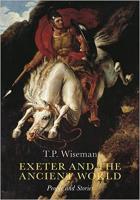
The Mint Press (2020) p/b 112pp £6 (ISBN 97811903356746)
After an introduction on the history of the city in which has lived and taught for many years, a retired classics professor offers some of the articles he has written (some for the in-house departmental magazine), talks he has given to local societies, and reflections on former colleagues and a distinguished alumna.
It could be a recipe for parochial self-indulgence. Happily, in the case of T.P. (Peter) Wiseman’s comparatively short book, nothing could be further from this. Far from being parochial, it uses examples from Exeter (Isca Dumnoniorum) as a jumping off point for wide-ranging discussions on a host of classical and literary topics.
A painting in an Exeter museum of ‘Marcus Curtius leaping in the Gulf’, sacrificing himself for the common good, is the starting point for the detailed study of the role of its ancient myths in affirming Rome’s continuing self-identity. A discussion of a colleague’s work on Shakespeare’s sources is the occasion for an erudite study of the nature of the extent of the access of Elizabethan writers to original Latin texts. An analysis of Rosemary Sutcliff’s novel ‘The Eagle of the Ninth’ in respect of the historical accuracy of her portrayal of Roman Exeter leads to a discussion of the place of archaeology in continually calling for the revision of ideas. And these are only three examples of the breadth of W.’s interests.
Far from being self-indulgent, W. is both generous and shrewd in his comments on colleagues and keen to point out how different people have found fulfilment through their engagement with classical studies. He tells of a retired American soldier and diplomat who, on moving to Devon, studied for a Certificate of Archaeology (and later for an MA and PhD) and went on to write a learned book on the Florentine Baptistry, which has so fascinated him when he served in Italy.
And then there is J.K. Rowling, who opted for Greek and Roman Studies as a subsidiary to her French degree at Exeter. W. traces the influence of this, not only on much of the nomenclature in the Harry Potter stories, but also the idiosyncrasies of some of the staff at Hogwarts, though he argues on the basis that the colour of his eyes does not match, that he cannot have been the inspiration for Dumbledore. The very breadth of the material covered by W. gives the lie to any idea that classics is a narrow, irrelevant study.
This book is a delightful miscellany, in which we meet so many interesting characters. There is even the brief mention of a South African professor who apparently believed that he could resolve textual cruces in Vergil by mediumistic access to the great poet’s spirit. If only! With a striking colour cover, four full page monochrome illustrations, a bibliography and index, this book is remarkable value at £6.00—indeed your reviewer had to check with the publisher that he had heard aright. The price was confirmed with the comment ‘We try to publish at cost’. We are indeed in their and the author’s debt.
Ray Morris
